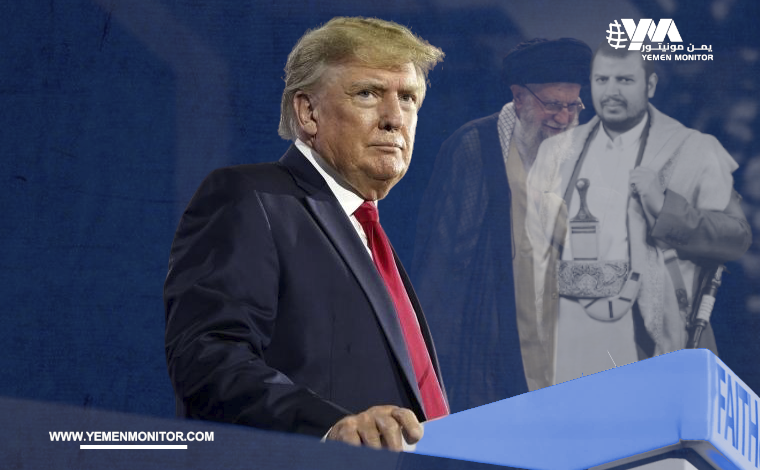What are Trump’s Options for Dealing with the Houthis?

Yemen Monitor / Reporting Unit:
On January 20, 2025, elected President Donald Trump will assume the presidency for a second time. During his first term, Trump’s administration radically reshaped U.S. foreign policy in line with his “US First” philosophy. In Yemen, he designated the Houthis as a fully-fledged terrorist organization, a decision that was reversed by Joe Biden the same month, who supported military operations against the armed group from the Saudi-led coalition.
Currently, Trump returns to a situation where the Houthis have transformed from a local armed group with Yemeni interests to an organization with regional ambitions, launching attacks in the Red Sea against Israeli and Western ships, which has suffocated about 12% of global maritime trade. The U.S. has been waging a war against the Yemeni movement for the past 10 months and has deployed approximately $2 billion worth of munitions to counter maritime attacks or target Yemeni territory.
There is a consensus in the Middle East that his second term will alter U.S. policy in the region. However, there is no agreement on the nature of this policy. While his election may herald a dramatic shift, the direction he takes will depend on whom he listens to. Donald Trump promised in a pre-election interview to end wars in the Middle East and restore peace in the region.
Andreas Craig, a researcher on the region, stated: “Trump is widely viewed as a man lacking a clear vision for the region. His regional policy will be determined by the most powerful lobbying groups in Washington: the pro-Israel lobby on one side and Gulf lobbying groups on the other.”
Houthis and the Red Sea Attacks
During an interview with Al Arabiya on October 20, Trump discussed the Houthi attacks in the Red Sea, describing them as “bad” and emphasizing the need to stop them from firing on ships. He stated, “There are a lot of missiles being fired at ships, more than people know. The situation is very bad. You can’t even use the navigation for trade. The alternatives to this major passage are expensive and not feasible!”
Since January 11, the US and Britain have been conducting airstrikes against Iranian-backed Houthi militants in Yemen, in addition to intercepting maritime attacks. The significant cost of the US deployment has been highlighted, where Houthi missiles and drones costing a few thousand dollars have been countered with a barrage of munitions costing nearly $2 billion.
US National Security Advisor John Kirby told reporters at a press conference last month, “We are working in the Red Sea with a coalition of about 20 other countries to continue shooting down the missiles and drones that the Houthis continue to fire at commercial shipping there. Our presence there remains strong. And our capabilities remain significant.”
Trump has been described as a dealmaker, and his first term saw a move away from Washington’s military involvement in costly conflicts.
Yemeni researcher and writer Mustafa Naji argues that Trump does not want to wage a war for his soldiers and will not bear the burdens of a military battle in Yemen alone, nor will he stand against Saudi Arabia’s desire to avoid returning to the square of battles around it, especially in Yemen.
In addition, the Houthis have strengthened their position in Iran’s resistance axis, and Tehran does not seem eager to abandon them with the influence of its main ally Hezbollah in Lebanon. Therefore, Trump may view the Houthis as enemies of his country and its Israeli allies, due to Iran’s backing.
Trump has promised to prevent Iran from building a nuclear bomb. At the same time, he seems reluctant to engage in conflict. On November 5, he said, “I don’t want to hurt Iran,” adding that he wants it to be a “successful country”; emphasizing that they are “very smart,” “great negotiators,” and “great businessmen.” He declared that “as a country, I want them to succeed.”
What Options Does Trump Have in Yemen?
Biden administration’s policy towards Yemen has led to an underestimation of the situation in Yemen and increased the size of the disagreements within the anti-Houthi camp, which has led to further fragmentation of the camp. It has also supported the transfer of power from former Yemeni President Abdu Rabbuh Mansour Hadi to an eight-member presidential council with conflicting objectives, representing Saudi Arabia and the United Arab Emirates. This has weakened the internationally recognized government.
Abdulghani al-Iryani, a senior researcher at Sana’a Center for Strategic Studies, says that the options available to the US and the international community in Yemen are limited. A large-scale military operation is out of the question. The US has no desire for another Afghanistan.
Al-Iryani added, “Even if they obtained sufficient weapons, the military commanders on the government side cannot do much while they suffer from division, corruption, and lack of institutional capacity. A futile military campaign is likely to have the opposite effect – convincing the international community to accept the Houthis as the de facto rulers of Yemen, just as happened with the Taliban in Afghanistan.”
“Therefore, the political option remains the only viable option. And it is summarized by reaching a comprehensive power-sharing agreement between all Yemeni actors,” says the senior researcher at the Sana’a Center.
To achieve this, al-Iryani believes that pressure must be exerted on the Houthis to lower their expectations as they are “now looking to completely seize parts of Yemen that they covet through the roadmap offered to them by the Saudis.”
Al-Iryani emphasized, “The government must become a reliable counterweight to the Houthis, so that it can demand and maintain a fair power-sharing agreement. Therefore, two basic conditions must be met to pave the way for a political solution to the conflict in Yemen.”
Two main objectives
The first objective is to enhance the defensive capabilities of the government forces and address the huge imbalance in military power between the Houthis and the government. They need to know that the oil and gas fields in Marib and Shabwa are beyond their reach. The presence of this deterrence, along with sanctions which targeting the front companies of the Houthis, will act as a stick. Meanwhile, the carrot will be funding for reconstruction and development as part of a peace agreement.
The second goal is to unify the leadership of the internationally recognized government and improve its governance and oversight. Reforming the Presidential Leadership Council would be a good first step, but the main challenge is to develop a unified military leadership.
He added that while Saudi Arabia and the UAE are still competing for influence in Yemen, the armed groups they support will never submit to such a structure, so it is important for Riyadh and Abu Dhabi to be on the same page.
Mustafa Naji believes that “resuming the war with a U.S. green light and without a party willing to bear the cost is unlikely, especially as the legitimacy forces are divided amid the transitional council’s reluctance to accept any new political formula that may emerge upon the conclusion of the battle with the Houthis.”
Craig states that the Gulf Cooperation Council(GCC) has become more united than it was in 2016. Regional integration has deepened cooperation and interconnectedness between the Arab Gulf countries. Pragmatism has prevailed in terms of how to bridge the gap between the GCC or between Iran and the Gulf. As a result, the foundation on which one of Trump’s old projects—a security alliance in the Middle East, primarily directed against Iran—was built has eroded over the past year.
Craig points out that “the crucial question here is to what extent Gulf lobbying networks will manage to work together to achieve a common stance on key regional issues such as Palestine, the Houthis, Iran, and the ‘Axis of Resistance.'”
It seems that Trump’s administration will face the Houthi dilemma in the Middle East. Even if it manages to stop the brutal Israeli war on Gaza, there is no guarantee that the Houthis will not use attacks in the Red Sea as a political leverage to gain internal advantages. The choice between entering a war—either directly or by supporting the internationally recognized government in its current form—or negotiating with the Houthis to halt attacks and gain concessions from U.S. allies will depend on the degree of Gulf consensus regarding Yemen, the unification of the Yemeni government and its allies, not the strength of the Houthis or the level of Iranian support.





